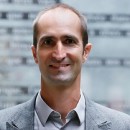What convinced you to join TSE?
When I arrived in 2008, I chose Toulouse above all to join an excellent research group working on applied mathematics and for the opportunity to explore inte- ractions with Toulouse economists. I took part in seminars, particularly on theo- retical economics, and held discussions with many colleagues, which enabled me to use my own expertise to respond to various economic questions and develop new research avenues at the crossroads between our disciplines. For instance, I worked on Beckmann-type models for urban economics that use mathemati- cal theories of optimal transportation to help understand how people choose their spatial allocations.
Economists, and this is especially true at TSE, are advanced mathematicians, and we have a natural shared understanding of the problems we face, which makes it
very easy to collaborate. Mathematics can of course be a great help in other disciplines. I have, for instance, done a lot of work with biologists on model- ling the emergence of a population of multicellular organisms from single- celled organisms. For several years, I have been conducting a general explo- ration of emergent properties in various applications.
How would you define emergent properties?
An emergent property is a system pro- perty that is not a property of any of the system's components, but of the system as a whole. This idea featured in the work of the first economists like Bernard Mandeville, David Hume, and of course Adam Smith with his famous "invisible hand". These systems are very interesting to physicists and mathemati- cians, since they become more and more
organized without using a centralized command system. Emergent properties are an inexhaustible well of interactions between scientific disciplines.
I have, for instance, been working for se- veral years with biologist Guy Theraulaz (CRCA) and physicist Clément Sire (LPT) on emergence in collective intelligence. More specifically, we're looking at the question of information transfer between individuals within a population so that the group as a whole can solve a pro- blem that an individual could not solve alone. We construct robust mathema- tical models to deliver forecasts based on analyzing data from experiments we have conducted ourselves at TSE.
What does interdisciplinarity mean for your work?
Interdisciplinarity is fundamental to my way of conducting research. It means combining approaches that are not usually used together, and above all, learning and questioning. The Institute for Advanced Study in Toulouse is an im- portant asset in this context. Discoveries from research into social sciences and biology always raise new questions and exciting avenues for investigation. These interactions are extremely precious to me and provide a challenge that is in- tellectually stimulating.
Extract of the TSE Mag#17 Summer 2018




